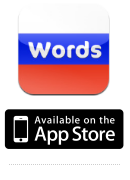 FR FR |
About us | Home | User agreement | Link to us |
Welcome to Russian!
Russian language, the language of Lev Tolstoy, Anton Chekhov, Alexander Pushkin, Fiodor Dostoyevsky, is worth learning just because these great people spoke Russian. More practical people would probably start learning Russian to travel, live or work in Russia. Whatever your objective is, foreign language will enrich your inner world, make you look at yourself in another way.
Learning Russian to become proficient in it is a hard work. But most people have quite certain objectives learning a foreign language. You may need Russian to explain yourself while traveling in Russia, write business letters in Russian, or read the original version of War and Peace. Try to get to know your strengths, weaknesses and possibilities. Decide whether you want to know just a few Russian words and phrases or be proficient in it. And we will set out into the most exciting journey!
Vocabulary is the first component of your success. According to specialists' estimates, 3000 words are sufficient for primitive social contacts. However one can not know enough words. One thing is for sure--the more a person knows the Russian language the... thicker dictionary will he/she be keeping on a bookshelf. Bilingual dictionaries are a good thing for starters. It is recommended to start using explanatory monolingual dictionaries as you progress with your studies.
Pronunciation is essential for you to understand other people and to be understood. You may want to listen to Russian language radio on the Internet and repeat announcer's words. This will contribute to your speaking fluent Russian.
Russian grammar will help you to learn the language more consciously, quicker and more effectively. If you are not so lucky to learn Russian among its native speakers you will have to plunge into grammar. Once you are aware of basic grammar rules and patterns you will use them subconsciously in the future to construct new sentences. Studying grammar consists of learning as many grammar patterns as possible.
Writing is often secondary in studying the Russian language but still important. Writing exercises are useful because they make you analyze each word and remember it better.
Vocabulary, grammar, pronunciation and writing are good but not enough to understand Russian and Russians. How can you read Russian books without knowing what borsch is, or how much a kopeck is? Reading Russian literature and expanding your range of interests will give you this knowledge and make the studies more fascinating.
Further reading:
Let's
Learn Russian
An article about two inner factors of success and ten basic principles
of organizing a self-learning process.
Oral
Speech and Writing
Learn how you can develop your speaking and writing skills.
Pronunciation
and Grammar
Advice on developing accurate Russian pronunciation plus four basic
principles of learning grammar rules.
Listening
and Reading
Here you will get advice on developing your listening skills and
learn about extensive and intensive reading.
Got questions?
Ask them in the Russian Questions and Answers — a place for students, teachers and native Russian speakers to discuss Russian grammar, vocabulary, pronunciation, and other aspects of the Russian language.
Copyright 2001-2026 MasterRussian.com | Privacy Policy | Contact Us
 Russian Lessons
Russian Lessons
- Russian alphabet
- Names of letters
- Russian Q&A new
- Pronunciation: Cons.
- Pronunciation: Vowels
- Noun Gender/Number
- Cases of Nouns
- Russian Greetings
- Personal Pronouns
- Learning Russian
- 1000 Common Words
- 500 Russian Verbs
- Top Russian Nouns
- » All lessons
- » Guest lessons
 Browse Topics
Browse Topics
- Start learning Russian
- Forum
- Bookstore
- Dictionaries
- Russian - basic
- Russian - adv
- Pronunciation
- Russian Blog new
- Reading
- Test & quizzes
- Translation
- Verbs
- Verb Conjugations
- Russian numbers
- Russian Tests new
- Vocabulary
- Writing
- Folk music
- Fun stuff
- Leo Tolstoy
- Learner's lore
- Literature
- Personal blogs
- Picture Dictionary new
- Proverbs
- Publications
- Radio & TV
- Russian culture
- Schools in Russia
- Russian Words
- Russian names
- Software
- Russian Words iPhone
Clicks the "Like" button below to get daily updates on Facebook!
Click "Add to circles" to learn Russian on Google+

Search MasterRussian

English » Russian dictionary

WORD OF THE DAY
![]() RSS
|
iGoogle
|
My Yahoo!
RSS
|
iGoogle
|
My Yahoo!
Meaning: face, front, countenance
Pronunciation: [lee-TSOH]
Learn Russian words! »
TODAY'S STREET SIGN

Russian: Аптека
English: Drug store
FOLLOW US ON TWITTER

MasterRussian on Twitter


